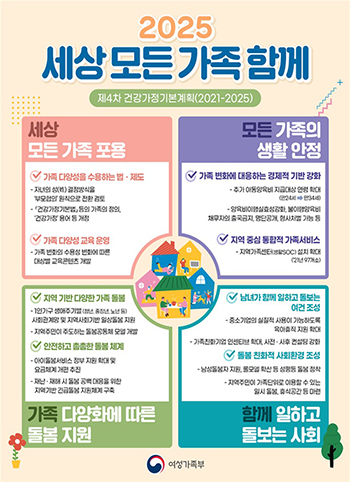 This is a poster of the “Fourth Basic Plan for Healthy Families.” /Extracted from the Ministry of Gender Equality and Family |
Fujita Sayuri, a broadcaster, is starring in “The Return of Superman,” a television show that shows celebrities raising their children themselves. She has recently caused a surprise, and stirred controversy with her non-marital birth. Regarding her choice, some viewers are pleased to see her on the program. However, some of the other viewers are negative about her appearance, saying that she encourages non-marital birth. As to conflicting opinions, the production team released a message asking for warmth and understanding, saying that she is only an example of an unfamiliar kind of family form.
On April 27th, the Ministry of Gender Equality and Family announced the newly revised “Fourth Basic Plan for Healthy Families.” It would recognize not only marriage, blood ties and adoption, but also non-married couples, elderly cohabitation, and foster families as one of the types of family. This announcement of the new bill raises questions and expectations about whether a new type of family could arise from the generation 2030. Nowadays, the proportion of the people who choose to stay single rather than getting married is increasing, and many people in their 20s and 30s sympathize with the idea of recognizing them as a new form of family even if they are not related by blood.
Basic Plan for Healthy Families has been revised
The “Basic Plan for Healthy Families” is a bill that has been implemented since January 1st, 2005. It contributes to the implementation of healthy families by clarifying the rights and duties of the people and the responsibilities of the state and local governments.
The “Fourth Basic Plan for Healthy Families” has been implemented from 2021 to 2025, reflecting recent family changes such as the increase of single-person households, diversification of family types and family life cycles, with an aim to strengthen diversity, universality, and gender equality. First, on diversity, it is known to focus on creating conditions in which all families are respected without discrimination and are not excluded from the policy. Second is universality. It strengthens customized support for single parents and multicultural families, while expanding the policy paradigm with universal family support. Third is gender equality, which is said to have strengthened the policy stance of gender equality, which values the balance of both men’s and women’s right to work and care. As described above, the Fourth Basic Plan aims to create a society that respects all families and their members, planning to improve discriminatory terms such as “out-of-wedlock,” reviewing non-fulfillment of childcare obligations, changing the principle of parental consultation, and increasing the age.
People have variety of opinions about the bill
The Dongguk Post interviewed a student who is in favor of non-maritalist. Lee Yeon-seo, a sophomore of the Department of English Interpretation and Translation, said that she is aware of the contents of next month’s newly revised bill, “The Fourth Basic Plan for Healthy Families,” expressing her consent to the law which recognizes single couples or non-marriage families as one of various family types. Also, she said, “I think the law that will be revised next month can embrace a variety of family forms as time changes. Family-only tenacity and intimacy do not have to be ‘marriage.’ This is because the broadcast shows that you can have as much intimacy as a family formed through marriage. In addition, I think it ensures that every family has a stable living. Before the revision, the government expanded support for families with relatively difficult lives, including medical expenses, child support, stability for single and adolescent parents, and strengthening the business of providing services to socially vulnerable families. I think it is a good bill in that the quality of care increases. In order to reduce the burden of care, the fare system has been reorganized and care space has been expanded, so the quality of care has improved and the inclusion of various children has led to both diversity of family forms and universality of family support.” She spoke in favor of the revised bill.
However, not everyone’s opinion is as above. Some people oppose non-maritalism and support marriage through traditional marriage systems. Cho, a sophomore of Konkuk University, said that she was in favor of marrying and establishing a family in accordance with the traditional marriage system rather than not marrying. She said, “I am more concerned than in favor of the ‘Fourth Basic Health Family Plan’.” She also said, “Families made up of marriage, blood ties, and adoption can be considered families, but questions arise about whether a family made up of only one heart can be recognized as them without such a promise or genetic identification. It is expected to cause a lot of confusion in society if families are recognized as families without formal procedures. If we recognize cohabiting couples who live together without marriage or non-married couples who support non-marriage as families, we cannot support the bill because it could break the traditional system and cause confusion in society.”
There are two conflicting views on the arrival of a new family in 2030. There is no answer to which view is right and which is not, but we have to take a look at the government’s choice of making decisions based on the fast-changing trend of the times from an objective perspective. Looking at the examples in which the revised bill applies in real life, individuals should decide whether to support it or oppose it based on subsequent results.

